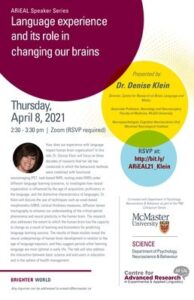By Dr. Denise Klein, April 8, 2021, 2:30 – 3:30 pm
This talk is co-hosted by the Department of Psychology, Neuroscience & Behaviour as part of the PNB Colloquium and ARiEAL Research Centre as part of the ARiEAL Speaker Series. Dr. Denise Klein is a scientist and neuropsychologist in the Cognitive Neuroscience Unit at the Montreal Neurological Institute and Hospital (MNI), and an Associate Professor in the Department of Neurology and Neurosurgery at McGill University, Montreal, Quebec, Canada. Dr. Klein is the director of the Centre for Research on Brain, Language, and Music (CRBLM). She obtained her Ph.D. at the University of Witwatersrand in Johannesburg, South Africa. Dr. Klein’s thesis research focused on developmental reading problems in bilingual children. Dr. Klein’s current research program aims to understand how language experience influences and shapes brain organization. She pioneered neuroimaging investigations of bilingual language representation, and has published ground-breaking work related to plasticity in the brain, in high impact journals and attracted interest from private philanthropy in Montreal. Her team also uses tasks and tools developed in the lab to run a pre-surgical mapping program at the MNI and does research to assess how different brain lesions impact functional performance on various language and other cognitive tasks. In 2018, Dr. Klein was awarded a Healthy Brains, Healthy Lives (HBHL) innovative ideas grant for translational work using machine-learning and speech samples for diagnosis. Her contributions relate to providing expertise on language learning and directing the CRBLM which offers significant opportunities to over 80 members, more than 300 students across 5 Quebec Universities.
In this talk, Dr. Denise Klein will focus on three decades of research that her lab has conducted in which the behavioral methods were combined with functional neuroimaging (PET, task-based fMRI, resting-state fMRI) under different language learning scenarios, to investigate how neural organization is influenced by the age of acquisition, proficiency in the language, and the distinctive characteristics of languages. Dr. Klein will discuss the use of techniques such as voxel-based morphometry (VBM), cortical thickness measures, diffusion tensor tractography to enhance our understanding of the critical-period phenomena and neural plasticity in the human brain. The research also addresses the extent to which the human brain has the capacity to change as a result of learning and biomarkers for predicting language learning success. The results of these studies reveal the neural underpinnings of human brain development in relation to the age of language exposure, and they suggest periods when learning language are most optimal in early life. The talk will also address the interaction between basic science and end-users in education and in the sphere of health management.


